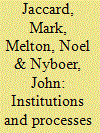| Srl | Item |
| 1 |
ID:
175570


|
|
|
|
|
| Summary/Abstract |
Using a localized perspective, this paper explores the gap between the eligibility criteria for a Beijing hukou (household registration) and the reality of successfully acquiring one. By comparing those who are eligible to apply with those who actually succeed in gaining a hukou, it reveals that hukou practices are operated locally to serve the city's development needs. It also reveals huge gaps between migrants, eligible applicants and hukou winners. Most migrants in Beijing are not eligible to apply for a local hukou. However, among those limited applicants who can apply, those with a postgraduate education and who serve the capital's political functions are more likely than others to win a hukou, an advantage not pointed out in government documents. These “hidden” rules are most likely set intentionally by the city so that it can maintain absolute control over hukou transfers; however, at the same time, they frustrate migrants who meet the stated requirements but who are in reality still unlikely to ever acquire a Beijing hukou. These findings open up a novel perspective for exploring the people–city nexus in China during the migration process and highlight the gaps between policy and reality for those who can apply for a Beijing hukou and those who actually win one.
|
|
|
|
|
|
|
|
|
|
|
|
|
|
|
|
| 2 |
ID:
105824


|
|
|
|
|
| Publication |
2011.
|
| Summary/Abstract |
The dramatic scale-up of renewable energy over the coming decades is likely to pose significant challenges for coordinating land use allocation, environmental assessment, energy system planning and the design of greenhouse gas abatement policy. Of particular concern is the establishment of institutions and processes that enable consideration of multiple objectives and attributes, with adequate representation of affected interests, and without resulting in excessive delays in the development of renewable energy as part of a greenhouse gas abatement strategy. This paper uses the Canadian province of British Columbia as a case study for describing these challenges and the responses of policy makers seeking to rapidly scale-up renewables. Using evaluative criteria to assess this experience, we identify lessons that may be applicable to other jurisdictions seeking to quickly expand the production of renewable energy. These lessons include the design of institutions and processes that would likely be required in almost any jurisdiction with similar aims.
|
|
|
|
|
|
|
|
|
|
|
|
|
|
|
|